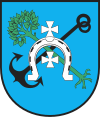Jedwabne
| Jedwabne | ||
|---|---|---|

Saint Jacob Church
|
||
|
||
| Coordinates: 53°17′N 22°18′E / 53.283°N 22.300°E | ||
| Country |
|
|
| Voivodeship | Podlaskie | |
| County | Łomża | |
| Gmina | Jedwabne | |
| Area | ||
| • Total | 11.47 km2 (4.43 sq mi) | |
| Population (2006) | ||
| • Total | 1,901 | |
| • Density | 170/km2 (430/sq mi) | |
| Postal code | 18-420 | |
| Website | http://www.jedwabne.pl/ | |
Jedwabne (pronounced [jed'vabne]; Yiddish: יעדוואבנע, Yedvabna) is a town in Poland, in the Podlaskie Voivodeship, in Łomża County, with 1,942 inhabitants (2002).
First mentioned in 1455, Jedwabne received city rights on July 17, 1736, from the Polish king August III, including the privilege to hold weekly markets on Sundays and five country fairs a year. A wooden Catholic church with two steeples was built in 1737–1738, and a synagogue around 1770. The Jedwabne synagogue was a fine example of the unique Polish Jewish architectural tradition of wooden synagogues. At the end of the 18th century new textile factories opened. In 1851 there were as many as 17 weaving establishments employing 36 workers in the town. In terms of its cloth production Jedwabne was already the eleventh-largest manufacturing centre in the Kingdom of Poland. By 1862, 11 mechanical and 13 manual weaving machines had been installed at Jedwabne. The town's cloth production fell into decline only after the January Uprising of 1863, due to Russian repression against Polish and Jewish entrepreneurs. The town was the center of a large Jewish community; its population in 1900 was 1,941.
Following the Soviet invasion of eastern Poland in World War II (in fulfillment of the Molotov–Ribbentrop Pact), a wave of anti-Polish repression by the Soviet Secret Police was conducted between 1939 and 1941. It was preceded by a successful Soviet attack against a Polish partisan unit stationed in the Kobielne Wilderness. The town had 3,985 inhabitants in 1940; some 3,670 Poles, 250 Jews and 65 Belarusians. A number of Polish people with their families were arrested by the NKVD and deported to Siberia.
...
Wikipedia


